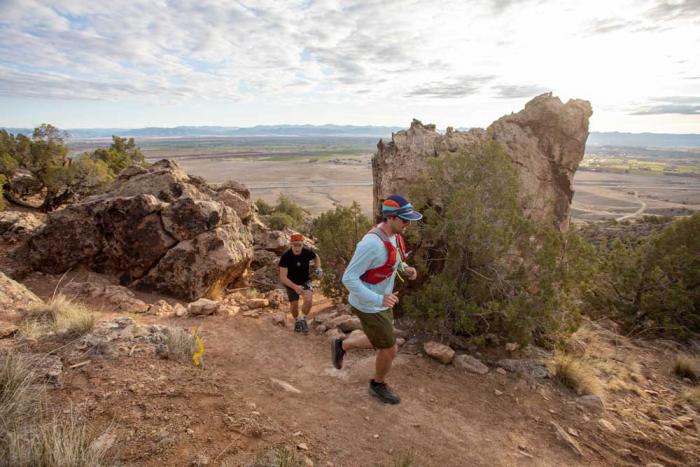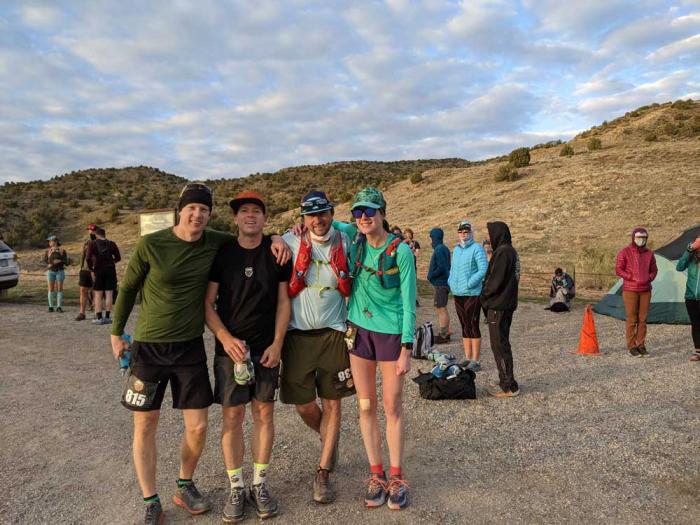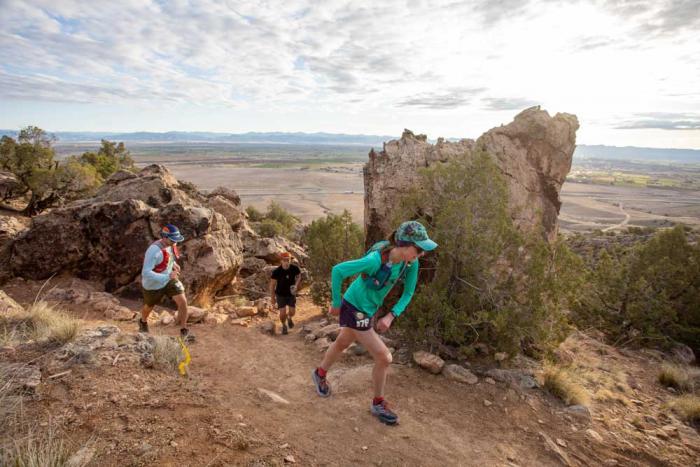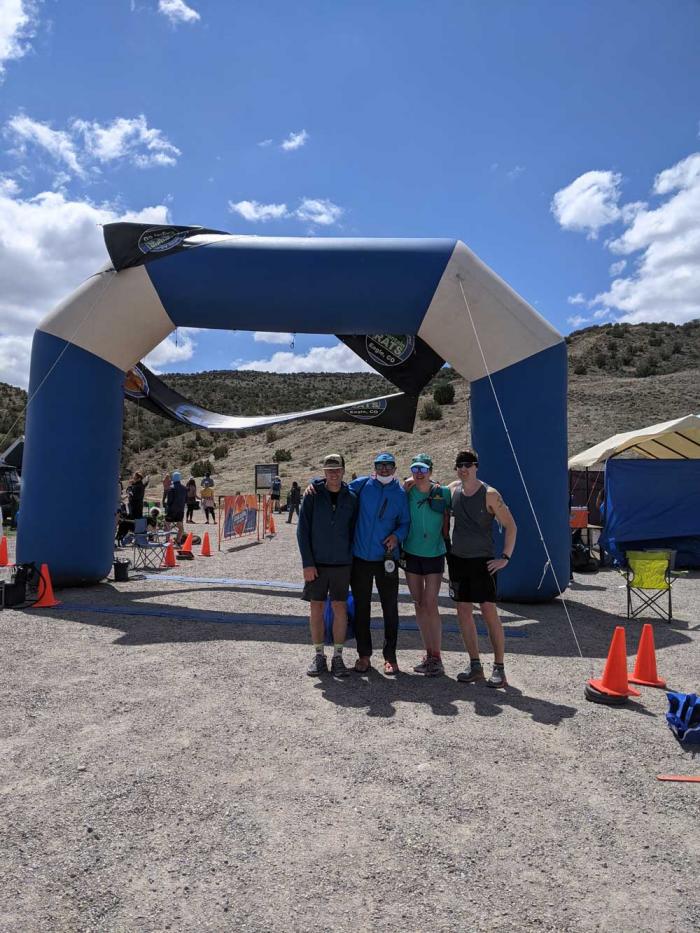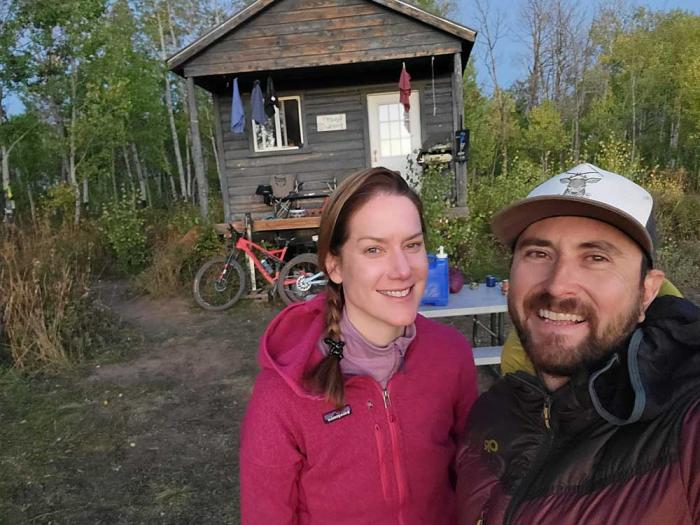Off-the-clock: Completing a trail marathon for the first time
Doing a marathon is one thing.
Doing a marathon on the rim of a canyon through dirt, mud, rocks or grass with hills and steep slopes? That’s something else.
For Bryan Frazier, survey supervisor at Denver Water, that something was on his bucket list.
And in April 2021, he crossed off his list “do a trail marathon.”
“I’d been thinking about it for a long time,” Frazier said. “I’ve always wanted to do one to prove to myself I could do it.”
Frazier is an outdoor sports enthusiast who’s been skiing, cycling and mountain biking for years. A native of Washington state before moving to Colorado, mountains have been his playground his whole life.
But when Frazier and his wife, Libby (short for Elizabeth), couldn’t get up into the mountains in 2020 during the coronavirus pandemic, they would go for runs around Cheesman Park in Denver to get in a workout.
“Libby’s more of a runner than I am, and we did a trail half-marathon two years ago in Eagle,” Frazier said. “We decided it was time to do a full marathon and started a training program.”
Marathons are 26.2 miles, and while most marathon courses take place on paved streets or paths, a trail marathon involves different terrain and could include a combination of hiking, running or walking as the runner navigates more obstacles than those offered by a paved route.
Frazier and his wife decided to tackle a marathon course in Fruita, at the edge of Ruby-Horsethief Canyon. The trail network sits above the canyon rim with views of the Colorado National Monument.
“We were running on a trail network called the Kokopelli Loops, which are red rock sandstone with views overlooking the Colorado River,” Frazier said. “I knew those trails from mountain biking.”
For the marathon, the course elevation ranged from 4,500 to 5,400 feet and climbed a grueling 3,400 feet.
To prepare, training quickly became the major focus for the couple during their free time.
“When we previously did the half-marathon, we didn’t train half as hard as we did for the full one,” Frazier said.
“At one point, I was wondering what we were doing for the weekend, and remembered, ‘Right, we’re running.’”
As Frazier learned, most of the training for the marathon was learning how to properly hydrate and fuel his body to make it through the entire 26.2 miles.
“During the first 10 miles, I really didn’t feel like I had much need for water,” Frazier said. “Still, I’d have to preemptively load my body with water and calories to keep my body functioning for the next 10 miles.”
Calories played a big role in giving his body the fuel it needed, and Frazier laughed as he recalled his favorite part of training.
“Definitely eating whatever I wanted for the post-workout dinner,” Frazier said. “I remember thinking, ‘Wow, I just ate 3,000 calories in one meal. And I don’t care.’”
All those calories were put to good use during training, as their mileage counts scaled up and both Frazier and his wife learned how to maintain energy during their run.
“Every day I’d realize, ‘Today is the longest mileage I’ve ever run,’” Frazier said.
“I’d make it to 15 miles, then 16, then 17. And I would wonder every time how my body was going to handle those additional miles.”
The training program the couple followed, like all the other programs they looked at, stopped with their longest run: 20 miles.
Read more stories about the passion Denver Water employees bring on and off the clock.
“If you’re not a runner, you’d be surprised that we didn’t run a full marathon as a practice,” Frazier said.
“But up to 20 miles, it’s really figuring out what works for you physically and mentally to stay in it for those last 6 miles.”
During the actual marathon, the system that worked for Frazier was to drink water or electrolytes every mile or two, or about three and a half liters total. Then, every 5 miles, some calories.
“For calories, we’d eat energy gel packs, caplets or gummies, largely to get amino acids for fuel and a great energy boost,” Frazier said.
All the aid stations had peanut butter and jelly sandwiches, bananas and pickles. For Frazier, his favorite marathon food was inspired by Belgian stroopwafels.
“Honey Stinger waffles are flat, portable calories,” Frazier said. “And they taste really good.”
Fuel and hydration figured out, the next obstacle for Frazier to overcome was internal: his mind.
“The mental aspect of training was critical, and it was a constant focus to keep your head in the game,” Frazier said.
“I’d cruise along in the early mileage, but then each mile after that would be all new for how I’d handle it. My mind started to wander, and I’d have to refocus.”
And there’s a lot to think about when you’re in a marathon.
“I have to step lightly, get a stride, a good pace and then watch my breath and heart rate,” Frazier said. “That’s what I keep track of.”
During the marathon, Frazier said he would find a pace, sometimes joining other runners to pass the time with short conversations.
“One gentleman I ran with for a while was doing the marathon barefoot,” Frazier said.
“He was an interesting and positive individual who was very into and connected with nature, and his running style embodied his ethos. While he’d done a lot of running in the past, this was his first marathon. And he ran it barefoot. That’s just a whole other level.”
Frazier initially started the marathon with Libby and two friends who came to Colorado from Washington to do the race with them.
Unfortunately for the four of them, a pre-race dinner put a kink in their marathon plans.
“The night before, we ate at a restaurant and we’re pretty sure all of us got food poisoning,” Frazier said. Libby felt the worst.
“Though we kept seeing her and knew she was keeping pace, we lost her after mile 10 and she never got back with us again,” Frazier said.
“She was feeling terrible the whole time and had to walk a good 6-7 miles, though she did finish and was only 20 minutes behind us at the end.”
Frazier said it was amazing Libby did the marathon at all, between food poisoning and a knee injury that required stitches two weeks before the marathon.
“Her doctor cleared her, so after 10 days of rest, we basically got her stitches taken out on the way up to the marathon,” Frazier said.
While Frazier was grateful to have completed both the training and the marathon, he’s ready for new adventures.
“For me, I think I checked that box. A good run for me is in the 5- to 6-mile range,” Frazier said.
“I think the largest lesson I learned during training was about the importance of hydration and calories, even when I’m out doing normal activity,” Frazier said. “I know my body performs better because I’m drinking more water.”
Frazier’s next bucket list item might be something related to long-distance mountain biking.
“I like knowing that when I put my mind to doing these hard things, I can get it done,” Frazier said. “I’m thinking about doing a bike race in the French Alps next year.”
And for his next bucket-list item, Frazier might have to take his own advice.
“For adventures like this trail marathon, I think if you’re thinking about it, you should just do it.”


